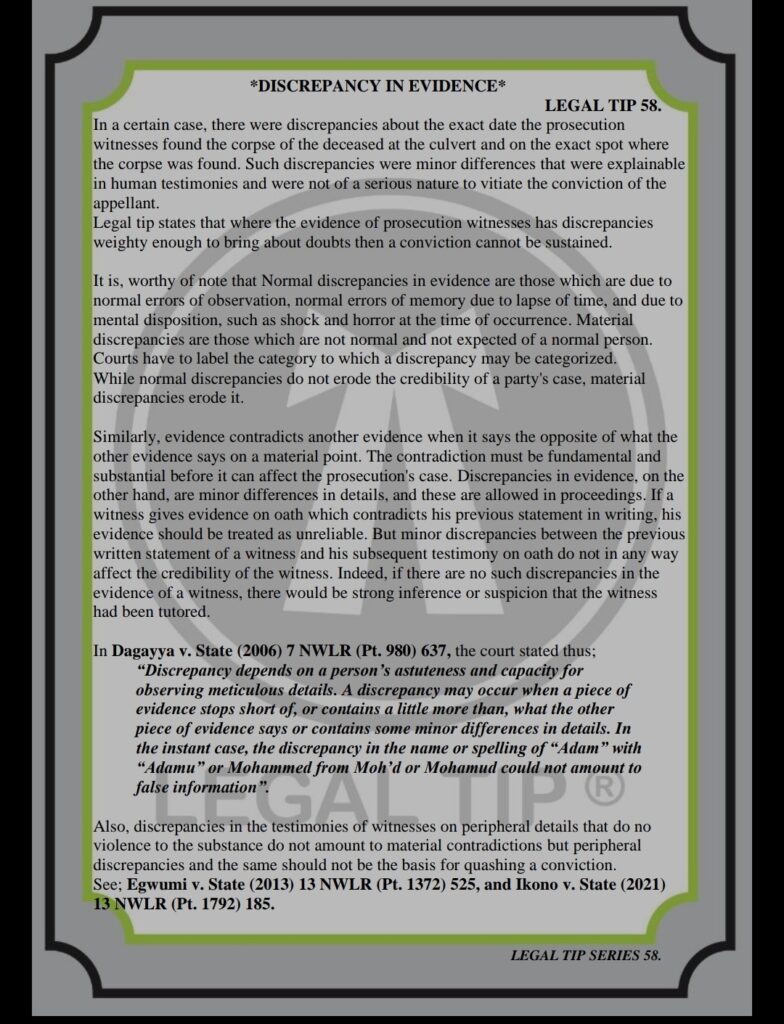In a certain case, there were discrepancies about the exact date the prosecution witnesses found the corpse of the deceased at the culvert and on the exact spot where the corpse was found. Such discrepancies were minor differences that were explainable in human testimonies and were not of a serious nature to vitiate the conviction of the appellant.
Legal tip states that where the evidence of prosecution witnesses has discrepancies weighty enough to bring about doubts then a conviction cannot be sustained.
It is, worthy of note that Normal discrepancies in evidence are those which are due to normal errors of observation, normal errors of memory due to lapse of time, and due to mental disposition, such as shock and horror at the time of occurrence. Material discrepancies are those which are not normal and not expected of a normal person. Courts have to label the category to which a discrepancy may be categorized.
While normal discrepancies do not erode the credibility of a party’s case, material discrepancies erode it.
Similarly, evidence contradicts another evidence when it says the opposite of what the other evidence says on a material point. The contradiction must be fundamental and substantial before it can affect the prosecution’s case. Discrepancies in evidence, on the other hand, are minor differences in details, and these are allowed in proceedings. If a witness gives evidence on oath which contradicts his previous statement in writing, his evidence should be treated as unreliable. But minor discrepancies between the previous written statement of a witness and his subsequent testimony on oath do not in any way affect the credibility of the witness. Indeed, if there are no such discrepancies in the evidence of a witness, there would be strong inference or suspicion that the witness had been tutored.

In Dagayya v. State (2006) 7 NWLR (Pt. 980) 637, the court stated thus;
“Discrepancy depends on a person’s astuteness and capacity for observing meticulous details. A discrepancy may occur when a piece of evidence stops short of, or contains a little more than, what the other piece of evidence says or contains some minor differences in details. In the instant case, the discrepancy in the name or spelling of “Adam” with “Adamu” or Mohammed from Moh’d or Mohamud could not amount to false information”.
Also, discrepancies in the testimonies of witnesses on peripheral details that do no violence to the substance do not amount to material contradictions but peripheral discrepancies and the same should not be the basis for quashing a conviction.
See; Egwumi v. State (2013) 13 NWLR (Pt. 1372) 525, and Ikono v. State (2021) 13 NWLR (Pt. 1792) 185.
LEGAL TIPS is anchored by Ms CIA Ofoegbunam, an Abuja-based lawyer who is passionate about legal practice.LEGAL TIPS offers quick hints on substantive law, as well as rules of practice and procedure, and serves as a handy reference guide to lawyers, especially in court.Published on a weekly basis, the LEGAL TIPS Series is CIA’s modest contribution to legal development in Nigeria.



